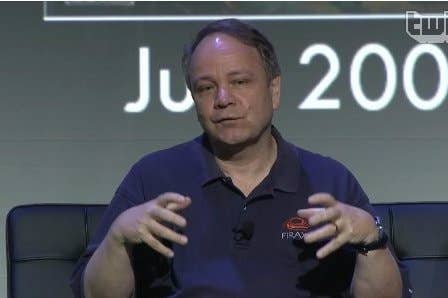Why Civilization never "crashed and burned"
Sid Meier, Brian Reynolds, and Soren Johnson discuss the creation and reinvention of the classic turn-based strategy game
The original tagline on the packaging for Sid Meier's Civilization was "Build an Empire to Stand the Test of Time." While the line was directed at the players, it accurately describes what the strategy franchise's developers have done for the past quarter century.
During the DICE Summit's Thursday morning keynote, a Civilization 25th anniversary panel featuring key designers from the first four titles in the series: Sid Meier (Civ I), Brian Reynolds (Civ II), and Soren Johnson (Civ III and IV) took turns reflecting on the reasons behind the series' enduring success, with Bruce Shelley (Civ I) guiding the discussion as moderator.
One of the first topics to be broached was how Civilization even became a franchise in the first place. Recalling the early days of development on Civilization II, Reynolds said there hadn't been many sequels to open-ended games at that time.
"We didn't even know how to do a sequel back then," Reynolds said. "So we had to figure out, 'What is a sequel to a game where you're not continuing the story with some characters because it was the entire history of the world, and it was the characters and events that you made?'"
MicroProse itself didn't seem convinced there was a good answer to that question. Reynolds said the publisher had projected Civilization II to sell 38,000 copies in its lifetime.
The answer Reynolds said he eventually came up with was to improve lots of little things, taking broad strokes concepts in the original and fleshing them out a bit, and combing fan feedback and Usenet newsgroups for ideas. But one of the biggest additions he made to the series was also one of the last, and happened in the final month or so before the game's launch.
"[W]hen Brian introduced the idea of modding, the game just took off. People want that ownership. They want to design their own game and have the game work the way they want to play."
Sid Meier
"I was interested in scenario builder/map editor kinds of things," Reynolds said, "and I think some executive came in and saw me working. He said, 'What are you working on?'"
Reynolds replied it was a map editor, only to be told by the executive to cut that feature, that he should be focusing on meeting the deadline for the game.
"This is why I am every producer's nightmare," Reynolds said. "So I of course worked on nothing but the scenario editor and modding stuff until it was done."
Modding became a staple of the series, and Johnson made sure that Civilization III and IV expanded on the idea and actually encouraged modding, even though as he said, "It's sometimes hard to justify the value of modding to people more on the business side."
Perhaps Meier's endorsement--and the way he tied it into engagement and community building--would convince them.
"I think the community has sustained the game over the years," Meier said. "So many of their ideas and their energy has gone into the game to keep it alive. And I think when Brian introduced the idea of modding, the game just took off. People want that ownership. They want to design their own game and have the game work the way they want to play."
Reynolds' success with Civilization II only increased the pressure on Johnson when he joined the Civilization III team.
"When you work in a franchise like this, you're always afraid of, like, 'I don't want to screw up the formula,'" Johnson said.
"That was the great fear hanging over me. I did not want to be the guy that went down in history as having broken Civilization."
Brian Reynolds
Reynolds sympathized, saying, "That was the great fear hanging over me. I did not want to be the guy that went down in history as having broken Civilization."
"Exactly," Johnson said. "Is there something magic in there we don't understand, that if I take it apart I won't be able to put it back together again?"
To guide Civ III development, Johnson leaned on a guiding principle of thirds. The game should be one-third old, one-third improved, and one-third new.
"That's a good point that this franchise has been able to sustain itself over this period of time," Meier said. "I think we know many of the classic games have kind of crashed and burned for one reason or another. That idea of keeping one-third of the core, improving one-third of the game, and then adding one-third new features has kind of allowed us to stay in contact with our players but also introduce new players to the game. And there's always a temptation. I think some franchises have kind of gone in the overly complex, overly large direction and kind of crashed and burned."

